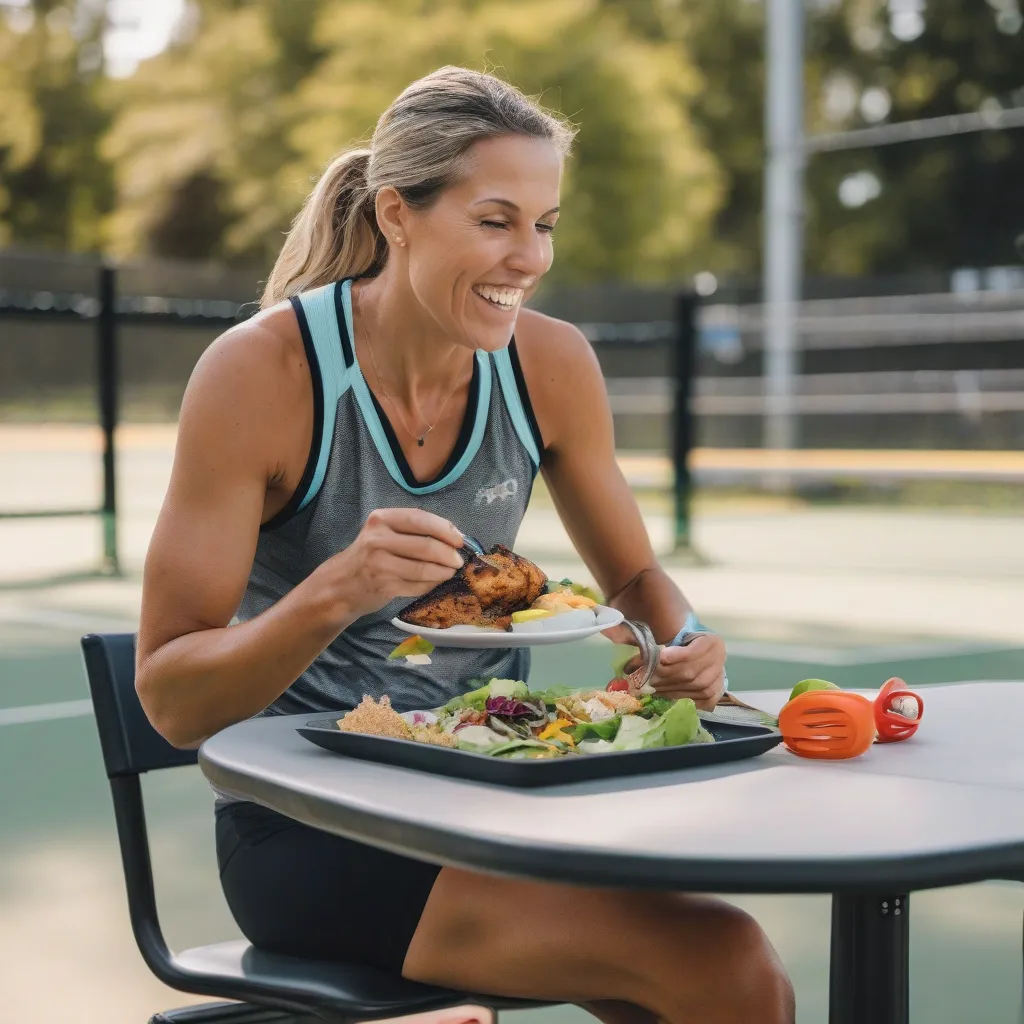Table of Contents
Introduction to Nutrition for Pickleball Athletes
Nutrition plays a crucial role in the performance and overall health of pickleball athletes. A well-balanced diet provides the energy needed for intense play, aids in recovery, and helps prevent injuries. This guide covers essential nutrition tips for pickleball athletes to help you stay energized and perform at your best on the court.
Why Proper Nutrition is Important for Pickleball Athletes
Proper nutrition offers several benefits for pickleball athletes:
- Energy: A balanced diet provides the fuel needed for sustained energy during matches and training sessions.
- Recovery: Nutrients help repair muscles and tissues, reducing recovery time and improving performance.
- Injury Prevention: Adequate nutrition supports strong bones and muscles, reducing the risk of injuries.
- Overall Health: A healthy diet enhances overall well-being, boosting immunity and preventing illness.
 Nutrition for Pickleball Athletes
Nutrition for Pickleball Athletes
Top 10 Dietary Tips for Pickleball Athletes
1. Stay Hydrated
Hydration is vital for maintaining performance and preventing cramps and fatigue. Drink plenty of water throughout the day and increase your intake before, during, and after games. Hydration helps regulate body temperature and supports overall bodily functions.
2. Balance Macronutrients
Ensure your diet includes a balance of carbohydrates, proteins, and fats. Carbohydrates provide quick energy, proteins support muscle repair and growth, and fats supply long-lasting energy. A balanced intake of macronutrients is crucial for peak performance.
3. Eat a Pre-Game Meal
Consume a meal rich in carbohydrates and proteins about 2-3 hours before a game. This meal provides the necessary energy and sustains you throughout the match. Examples include whole-grain toast with peanut butter, oatmeal with fruits, or a chicken sandwich on whole-grain bread.
4. Fuel with Healthy Snacks
During extended play or training sessions, fuel your body with healthy snacks. Options include fruits, nuts, yogurt, or energy bars. These snacks provide quick energy boosts and help maintain blood sugar levels.
5. Recover with Post-Game Nutrition
After playing, replenish your energy stores with a meal or snack rich in proteins and carbohydrates. This helps repair muscles and restore glycogen levels. Examples include a smoothie with protein powder, a turkey sandwich, or a bowl of quinoa with vegetables.
6. Incorporate Antioxidant-Rich Foods
Foods rich in antioxidants help reduce inflammation and aid in recovery. Include fruits like berries, oranges, and cherries, and vegetables like spinach, kale, and broccoli in your diet. Antioxidants support overall health and reduce muscle soreness.
7. Maintain Electrolyte Balance
Electrolytes, such as sodium, potassium, and magnesium, are essential for muscle function and hydration. Replenish electrolytes lost through sweat by consuming sports drinks, coconut water, or foods like bananas, avocados, and nuts.
8. Avoid Processed Foods
Minimize the intake of processed foods high in sugars, unhealthy fats, and artificial additives. These can lead to energy crashes and negatively impact performance. Focus on whole, nutrient-dense foods to fuel your body properly.
9. Plan and Prepare Meals
Plan and prepare your meals in advance to ensure you have access to healthy food options. This helps you avoid unhealthy choices and maintain a balanced diet. Meal prepping can include cooking in batches and packing meals and snacks for convenience.
10. Listen to Your Body
Pay attention to how your body responds to different foods and adjust your diet accordingly. Every athlete’s nutritional needs are unique, so it’s important to find what works best for you. Keep a food diary to track your intake and performance.
Common Nutrition Mistakes and How to Avoid Them
Avoiding common nutrition mistakes can help you optimize your performance:
1. Skipping Meals
Skipping meals can lead to low energy levels and poor performance. Ensure you eat regular meals and snacks to keep your energy steady.
2. Overeating Before Games
Eating too much before a game can cause discomfort and sluggishness. Stick to light, balanced meals to stay energized without feeling weighed down.
3. Ignoring Hydration
Dehydration can severely impact your performance. Make hydration a priority by drinking water consistently throughout the day.
4. Relying on Supplements
While supplements can be beneficial, they should not replace a balanced diet. Focus on getting nutrients from whole foods first.
5. Consuming Too Much Sugar
High sugar intake can lead to energy spikes and crashes. Choose complex carbohydrates and natural sugars for sustained energy.
Resources for Further Learning
For more detailed information on nutrition for pickleball athletes, explore these valuable resources:
- Visit the USA Pickleball Association (USAPA) for comprehensive guides and tips.
- Explore nutritional advice and recipes on Pickleball Central.
- Check out detailed reviews and tutorials on Pickleball Portal.
- Learn from top nutritionists and coaches on PickleballMAX.
Conclusion
Proper nutrition for pickleball athletes is essential for maintaining energy, enhancing performance, and supporting overall health. By following these top 10 dietary tips, you can optimize your diet to meet the demands of the sport. Use this guide to fuel your body, recover effectively, and stay at the top of your game. With the right nutrition, you’ll be able to perform at your best and enjoy the sport of pickleball to the fullest.
Frequently Asked Questions
- Why is nutrition important for pickleball athletes? Nutrition for pickleball athletes provides the energy and nutrients needed for peak performance, recovery, and overall health.
- What should I eat before a pickleball game? Consume a balanced meal with carbohydrates and proteins about 2-3 hours before playing to ensure sustained energy.
- How can I stay hydrated during a pickleball match? Drink plenty of water throughout the day and increase your intake before, during, and after matches to stay hydrated.
- Where can I find more information on nutrition for pickleball athletes? Visit the USA Pickleball Association, Pickleball Central, Pickleball Portal, and PickleballMAX websites for comprehensive guides and tips.
- How does a balanced diet improve pickleball performance? A balanced diet provides the necessary energy, supports muscle recovery, prevents injuries, and enhances overall performance.